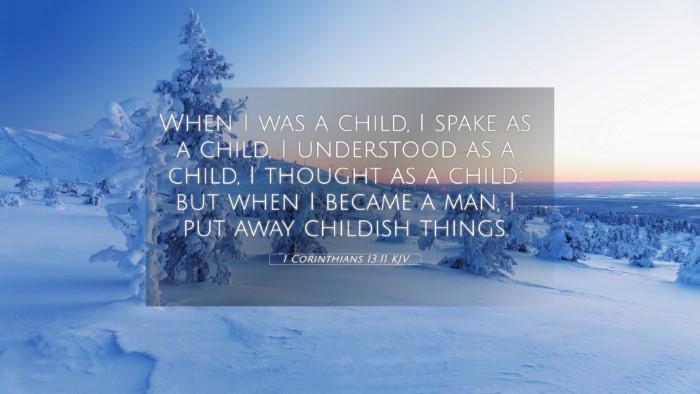Old Testament
Genesis Exodus Leviticus Numbers Deuteronomy Joshua Judges Ruth 1 Samuel 2 Samuel 1 Kings 2 Kings 1 Chronicles 2 Chronicles Ezra Nehemiah Esther Job Psalms Proverbs Ecclesiastes Song of Solomon Isaiah Jeremiah Lamentations Ezekiel Daniel Hosea Joel Amos Obadiah Jonah Micah Nahum Habakkuk Zephaniah Haggai Zechariah Malachi1 Corinthians 13:11 Similar Verses
1 Corinthians 13:11 Cross References
When I was a child, I spake as a child, I understood as a child, I thought as a child: but when I became a man, I put away childish things.
Uncover the Rich Themes and Topics of This Bible Verse
Listed below are the Bible themes associated with 1 Corinthians 13:11. We invite you to explore each theme to gain deeper insights into the Scriptures.
1 Corinthians 13:11 Cross Reference Verses
This section features a detailed cross-reference designed to enrich your understanding of the Scriptures. Below, you will find carefully selected verses that echo the themes and teachings related to 1 Corinthians 13:11 KJV. Click on any image to explore detailed analyses of related Bible verses and uncover deeper theological insights.

1 Corinthians 14:20 (KJV) »
Brethren, be not children in understanding: howbeit in malice be ye children, but in understanding be men.

1 Corinthians 3:1 (KJV) »
And I, brethren, could not speak unto you as unto spiritual, but as unto carnal, even as unto babes in Christ.

Galatians 4:1 (KJV) »
Now I say, That the heir, as long as he is a child, differeth nothing from a servant, though he be lord of all;

Ecclesiastes 11:10 (KJV) »
Therefore remove sorrow from thy heart, and put away evil from thy flesh: for childhood and youth are vanity.
1 Corinthians 13:11 Verse Analysis and Similar Verses
Understanding 1 Corinthians 13:11
In the Apostle Paul's first letter to the Corinthians, Chapter 13, Verse 11, he states:
"When I was a child, I spake as a child, I understood as a child, I thought as a child: but when I became a man, I put away childish things."
Verse Explanation
This verse encapsulates a critical theological and practical principle: the transition from immaturity to maturity in the Christian faith. Paul uses the metaphor of childhood as a way to express the initial stage of spiritual understanding, implying that believers must grow in their faith, understanding, and actions as they mature in Christ.
Thematic Analysis
- Spiritual Growth: Paul emphasizes the necessity of growth from elementary understanding to deeper insights. The parallels of this concept can be found throughout Scripture, encouraging believers to strive toward a mature faith.
- Childlike Faith: While childlike faith is vital, the transition to adulthood represents a deeper, more robust faith characterized by wisdom and discernment.
- Putting Away Childish Things: This signifies the abandonment of naivety and the embrace of wisdom, indicating that with growth comes responsibilities and a more profound commitment to God’s teachings.
Cross-References
To better understand the implications of 1 Corinthians 13:11, it is beneficial to explore these connecting verses:
- Hebrews 5:12-14: Discusses the need for spiritual maturity and the ability to discern good from evil.
- Philippians 3:13-14: Paul speaks about pressing forward and striving toward maturity in Christ.
- 1 Peter 2:2: Encourages believers to crave spiritual milk for growth, implying an expectation of progression.
- Ephesians 4:14: Warns against being tossed to and fro by every wind of doctrine, promoting the idea of growing into a stable, mature faith.
- James 1:4: Highlights the importance of perseverance leading to completion and maturity.
- Colossians 1:28: Describes the aim of pastoral ministry to present believers mature in Christ.
- Romans 12:2: Calls for transformation and renewal of the mind, essential elements of Christian maturity.
Insights from Public Domain Commentaries
Matthew Henry
Matthew Henry elaborates on the spiritual progression described in this verse, noting that just as children grow and leave behind their rudimentary thoughts, so must Christians progress in their spiritual understanding, leaving behind childish concerns and embracing a fuller knowledge of God's truth.
Albert Barnes
Barnes emphasizes the essential contrast Paul draws between childhood and adulthood in a spiritual context. He notes that as one matures, not only do their speech and understanding evolve, but so does their capacity to deal with complex spiritual truths, which are essential for a fruitful Christian life.
Adam Clarke
Clarke's commentary reflects on the innate characteristics of children and highlights the necessity of moving beyond mere emotional responses to faith. He interprets the putting away of childish things as a pastoral call for believers to seek understanding and wisdom as they engage more profoundly with their faith journeys.
Conclusion
1 Corinthians 13:11 serves as a powerful reminder of the Christian journey from spiritual infancy to maturity. By using cross-references and insights from commentaries, believers can deepen their understanding of this transition and its implications for their spiritual lives. Connecting and cross-referencing other biblical texts not only reinforces the message but also supports a holistic approach to biblical interpretation.
Further Study Resources
For those looking to examine the connections between scripture and enhance their study, utilizing tools for Bible cross-referencing, such as a Bible concordance or cross-reference guide, can be immensely helpful. These resources assist in identifying connections between Old and New Testament scriptures, themes in the Bible, and linking Bible verses relevant to one’s faith and practice.
Keywords for Further Reflection
- How to find cross-references in the Bible
- Comparative study of Pauline epistles
- Identifying connections between Old and New Testament
- Bible verses related to spiritual maturity


